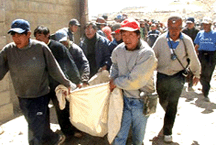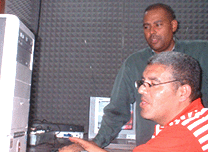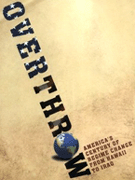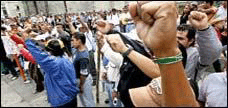
Tin War in Bolivia: Conflict Between Miners Leaves 17 Dead
October 7th was supposed to be a day of celebration for the Virgin of Rosario, the patron saint of miners. Yet events in Huanuni delayed the festival interminably.

October 7th was supposed to be a day of celebration for the Virgin of Rosario, the patron saint of miners. Yet events in Huanuni delayed the festival interminably.

The neighborhood of El 23 de Enero is like many improvised neighborhoods in Caracas clinging to the hillsides of the city; multi-colored apartments made of brick and cement were stacked on top of each other forming labyrinth-like alleyways and streets. One of many barrios in Caracas, the community was self-assembled by immigrants from the countryside, most of whom began by squatting land on the hills outside the center of the city, and assembling houses next to and on top of each other.

"Why does a strong nation strike against a weaker one?," Stephen Kinzer asks in the first line of his book Overthrow. "Usually because it seeks to impose its ideology, increase its power, or gain control of valuable resources." In this case, Kinzer is referring to the aggressive foreign policy of the United States in the last century, and specifically to the habitual, if extreme cases in which it has deposed foreign leaders in order to create a government more favorable to its own interests.

Since May 22, Oaxacan teachers have been occupying the main plaza in the city of Oaxaca. In the beginning of the occupation, the teachers' demands from the government were simple: fair wages to adjust for their cost of living and the guarantee of a better educational environment for their students, which to the teachers meant funding for books, supplies, uniforms and food.

In this interview, Raúl Zibechi discusses the challenges of the Evo Morales administration in Bolivia, the power and role of Bolivian social movements, projects for regional integration such as People's Trade Agreement and the Bolivarian Alternative for Latin America and the region's new situation after the electoral victories of various "progressive" governments.

In this post-9/11 "Era of Permanent War Crimes," U.S. antiwar activists have not yet been able to create a U.S. antiwar movement to end the U.S. military occupation of Afghanistan and Iraq or the U.S. government support for the Israeli war machine.
Copyright Toward Freedom 2019